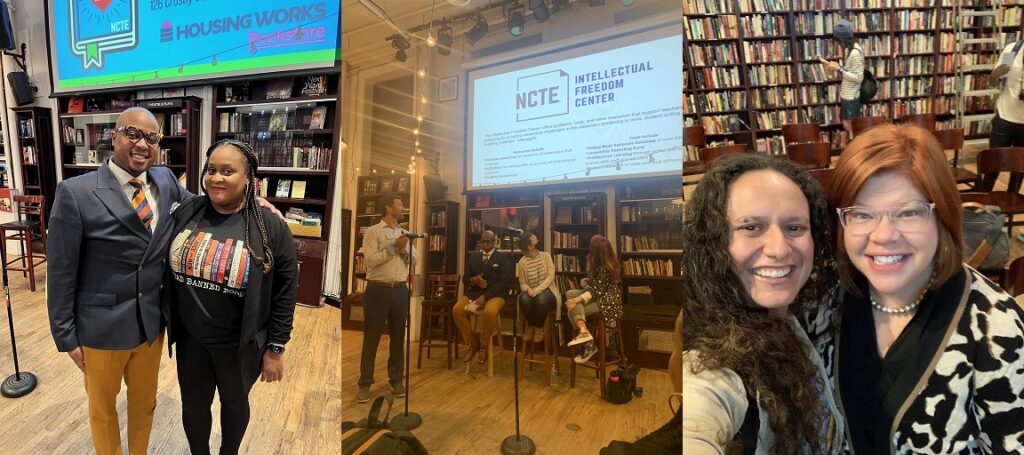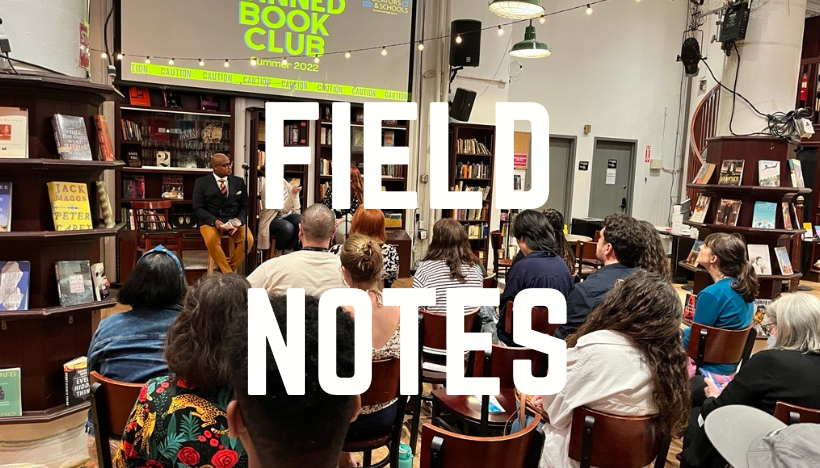Recently, NCTE President Valerie Kinloch and ALA President Lessa Kanani’opua Pelayo-Lozada wrote a joint op-ed around the dangers of banning books. The freedom to read brings humanity to us all by providing different perspectives, opportunities to expand our understanding of the world, inquiry, and a way to connect with other humans. One way to do that is by changing the narrative of the “book banners,” so NCTE leveraged Banned Books Week’s widespread awareness to do just that.
A Recap from the Week
This year, NCTE focused our efforts through partnerships. We started Banned Books Week with a trip to Indianapolis to speak with ELA leaders from 21 states across the country about our initiatives, including Build Your Stack®, the Intellectual Freedom Center, position statements, and more. Then NCTE hosted a gathering in support of intellectual freedom at Housing Works Bookstore in New York City. NCTE Executive Committee leaders LaMar Timmons-Long and Lakisha Odlum presented on their experiences with stories, student choice, and intellectual freedom. Listening to them speak and witnessing people tap into the expertise of literacy educators was exhilarating: their passion toward protecting stories and elevating the great work of NCTE as well as what Housing Works does with the LGBTQIA+ community brought an energy to the bookstore that left participants more knowledgeable about intellectual freedom and ready to join NCTE’s opposition to limiting access to students.

Later in the week, 25 state and regional affiliates of NCTE joined us alongside the NCTE Standing Committee Against Censorship in a national conversation on intellectual freedom through our This Story Matters campaign. The conversation focused on the landscape of censorship challenges in the classroom and provided resources available from NCTE and at the state level. Our friends at Penguin Random House Education joined us in support.
In a tremendous step forward, US Representative Jamie Raskin and US Senator Brian Schatz recognized NCTE for our best practice guidelines around literacy education in their bicameral resolution affirming the United States’ commitment to freedom of expression, while condemning the recent increase of book bans and educational gag orders sweeping the country!
We also remained focused on building capacity that furthers the expertise and freedoms of literacy educators by partnering with the American Federation of Teachers and other censorship-fighting organizations to oppose book bans through an ad in the New York Times.
What’s Really at Stake
Censorship challenges are at an all-time high over the past decade. In 2022 alone, 36 states have introduced 137 gag order bills. That’s more than a 250% increase from 2021. NCTE expanded its work in this area in January 2021, predicting a rise that’s now exceeded imagination. The fundamental value we share around the right to read is at risk, and it’s hurting our students the most. I spoke to ABC News on how high-quality educators are leaving the classroom because restrictions and punitive measures against teachers have made it too difficult to teach. Without high-quality teachers, we’re becoming a society that doesn’t apply critical thinking skills. This is already playing out with book bans themselves: the focus is on a passage deemed “controversial” without looking at the text holistically. Because of this, we are censoring humanity.
Do we see value in other people’s experiences and perspectives? Do we believe every student should have a window into their interests, into stories that might be different, and into stories from around the world? Are we a culture who agrees that problem solving and creating new opportunities are based on seeing different perspectives and possibilities, or not? These are questions we must ask ourselves, especially when our students speak about why a book matters to them and why a book should stay within reach.
Our Work Continues
For the sake of our students and our profession, we must continue collaborating and educating others. We need you to join us to protect intellectual freedom. Here are ways you can contribute:
Join us: Whether you’re an organization looking for partnership opportunities or a teacher needing resources and support, we want to work with you!
Write or review book rationales: We need our members’ expertise to write book rationales for new titles and/or to provide peer reviews to book rationales ready to be added to our This Story Matters database. This database is open to all members; please utilize this resource or use our template to create your own for your classroom.
Leverage NCTE resources: The Intellectual Freedom Center was established in the 1950s as a resource for you in the fight against censorship. Share the resources available with colleagues, parents, and anyone who could benefit from them.
NCTE will continue to advocate for intellectual freedom and the students’ right to read. Stories matter.

